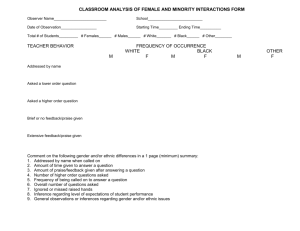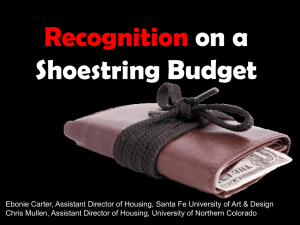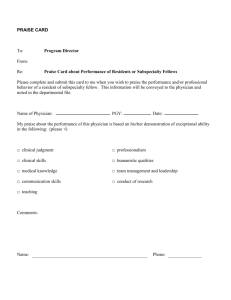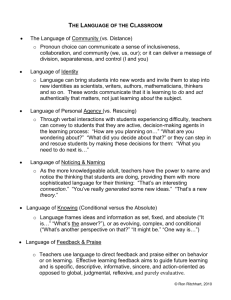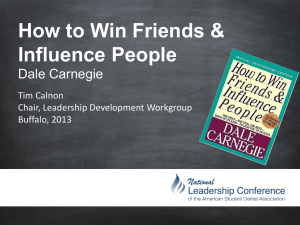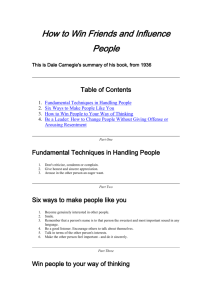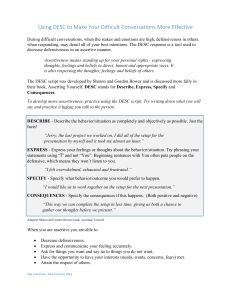So you want to be a leader
advertisement
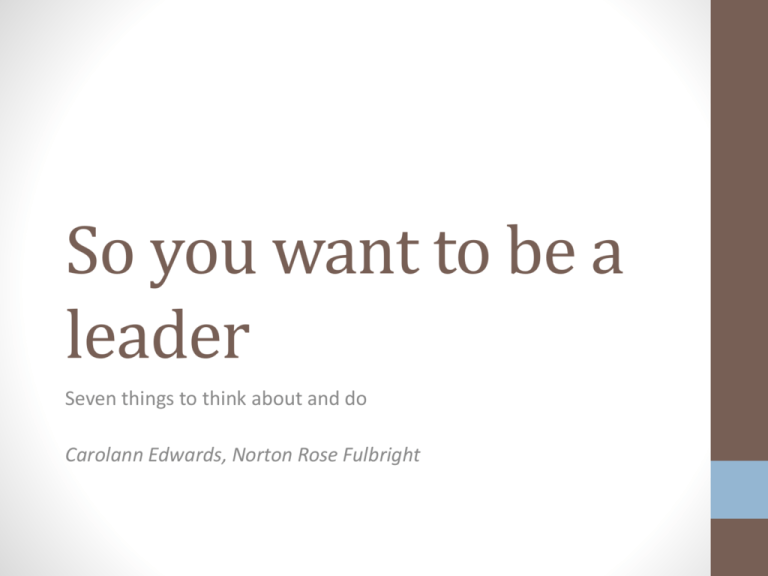
So you want to be a leader Seven things to think about and do Carolann Edwards, Norton Rose Fulbright Aims The aims of this session are: • To develop your understanding of leadership • To provide you with the knowledge and skills to become a leader Dartboard evaluation How much do you know about leadership? Put an X on the dartboard in the appropriate spot. A bullseye means you have perfect knowledge and understanding. The further away from the bullseye, the less knowledge you feel you have. Exercise 1: Board relay Instructions: • On the board, using single words and short phrases, explain what leadership is • Everyone in the team must take a turn to write something • You can’t go unless the pen has been passed to you! Exercise 1 cont. • Once the board is complete, 10 bonus points if you can use everything on the board to explain what leadership is. One volunteer per team - no conferring! Leadership defined “A girl who believes she can make a difference and acts individually and with others to bring about positive change” Adapted from Power Within, Care Exercise 2: what do female leaders do? On a piece of paper, write down: • The name of a girl or woman you consider to be a leader • Three things she does that make her a leader Confidence “Confidence is a feeling of trust in one’s abilities, qualities and judgment.” – Oxford English Dictionary Never let someone tell you that you can’t do something! Viewing #LikeAGirl campaign Watch this film: https://youtu.be/XjJQBjWYDTs How did the film make you feel? Building confidence Write a “letter to yourself” which talks about things you are proud of. These might be your school grades, your family, your sporting achievements and hobbies. Take your letter out and read it whenever you have periods of selfdoubt. Exercise: Optimism “The pessimist complains about the wind. The optimist expects it to change. The realist adjusts the sails.” – William Arthur Ward What is optimism? Hopefulness and confidence about the future or the success of something. How optimistic are you? Circle a number below Low 1 2 3 4 5 High Exercise: improving happiness Every night before you go to sleep, write down three good things that happened to you that day and the reasons why they were good. Good Thing Reason Goals – setting and reaching them The aim of goal setting is to achieve change. This often involves breaking old habits. You are most likely to achieve the goals you set if they are specific and realistic. Exercise: goal setting • On a piece of paper, write down a goal for yourself. Goal: _____________________________________ • With a partner, review what you have written. - Is it specific? - Is it realistic? • With the help of your partner, re-write your goal if necessary. Goal: _____________________________________ Assertiveness Speaking up for yourself in a way that is honest and resepctful Examples of assertive phrases: AVOID TRY “You’re wrong!” “I don’t agree” “You don’t care!” “I feel ignored” “You hurt me!” “I feel hurt” Dealing with difficult situations Describe Express Specify Consequences – what happened – how you feel about the situation – the actions that should be taken – of doing (or not doing) what you have suggested Exercise: dealing with difficult situations Think about a difficult situation you would like to resolve. Using the DESC method prepare to talk about your problem to a partner. Partners: give feedback. Describe the situation Express how you feel Specify actions to solve the problem (partners: suggest alternatives) Consequences of doing or not doing the above Praise and recognition Recognition and praise needs to be specific to each situation and individual if it is to be taken seriously and appreciated. Compare: 1. “Good job!” 2. “The way you structured your speech was really clear and the content was inspiring. Well done!” Which would you prefer? Exercise: giving praise Think of someone who has done something well. Use the DESC method to give praise: Describe the situation (what the person did) Express how you feel Suggest how the person could have the same positive impact in the future Consequences of continuing to do well Dartboard evaluation Now we are at the end of this workshop, place your X on the board again to show where your knowledge and understanding of leadership stands now. Final words As we have seen in this session, the following: • confidence • optimism • setting goals • assertive communication • using DESC to describe and deal with difficult situations • giving praise and recognition can all help you become a better leader
